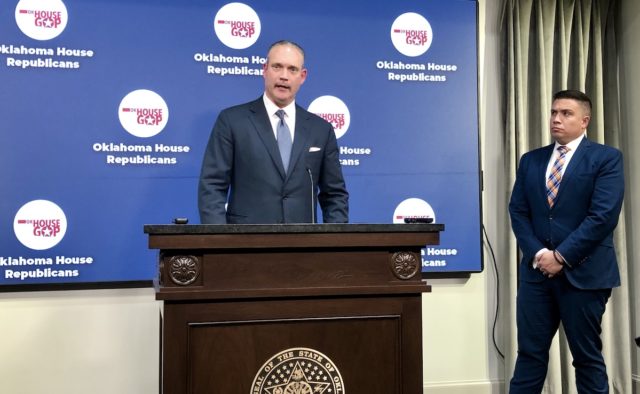
For the second time in his four years in office, Gov. Kevin Stitt has ended Oklahoma’s annual legislative session with a bevy of lawmakers mad at him.
In a final Friday that featured more stops and starts than a wreck-filled NASCAR race, the Legislature overrode six vetos of bills that Stitt had attempted to stop, and leaders of the House of Representatives unleashed a stream of criticisms one month ahead of a complex primary election.
The vitriol aimed at Stitt was ignited by his own press conference critiques of legislators one day prior, which included a unilateral call for a June 13 special session and remarks that infuriated a variety of Republican representatives. Both chambers gathered requests for veto overrides and slogged through negotiations Friday about what exactly they would force into law against Stitt’s wishes.
One measure, related to state recognition of traffic offenses adjudicated in tribal nation courts, prompted a prominent Republican to call Stitt “racist” on the House floor.
“With the governor vetoing this important bill, would it be safe to make the assumption that his racist and hateful behavior towards the tribes of this state is getting in the way of good public policy to protect Oklahomans?” House Appropriations and Budget Vice Chairman Ryan Martinez asked during presentation of the veto override on HB 3501.
The bill, which became law immediately after the House and Senate overrode Stitt’s veto, allows the Oklahoma Department of Public Safety to revoke driver’s licenses based on traffic offense convictions in tribal courts.
In his veto message, Stitt called HB 3501 “a wolf in sheep’s clothing.”
“It would essentially require the state to carry out tribal court adjudications, no questions asked. Specifically, it would bind the Department of Public Safety, a state agency, to recognize and act upon reports of conviction submitted by courts of any federally recognized Indian tribe located anywhere in the state of Oklahoma in the same manner it acts upon reports of conviction from state and municipal courts,” Stitt wrote. “If this bill had required of tribes what is expected of all legitimate government — namely; transparency, accountability, and reciprocity, among others, perhaps I would have signed it.”
Preston Lay, DPS legislative liaison, issued a statement opposing the measure Friday.
“HB 3501 was not requested by DPS, nor does DPS support it as there is still significant uncertainty about the jurisdictional reach and the transparency of tribal courts,” Lay’s statement said.
Nearly three weeks earlier, when Stitt vetoed the bill, Choctaw Nation Chief Gary Batton criticized the decision.
“Once again, Gov. Stitt has chosen division and his personal political ambitions over doing what is best for Oklahoma. Tribal courts and law enforcement agencies have a long history of cooperation with state and local governments, including 75 cross-deputization agreements between the Choctaw Nation and other governments,” Batton said. “Under this bill, drivers who violate the law and put others in jeopardy will be kept off the road. The governor’s petty decision to block enhanced coordination between criminal justice systems does nothing but hurt public safety.”
After both chambers pushed HB 3501 through, Batton issued another statement Friday, saying he was “grateful” for the Legislature’s decision.
“When this law takes effect, people will know dangerous drivers will face consequences whether they are convicted in state or tribal courts,” Batton said.
Martinez was one of the first sitting legislators to endorse Stitt for governor in 2018. But asked about his use of the term “racist” to describe the governor, Martinez said his “question stands.”
“At this point, I don’t know what else it could be. I mean, I don’t know,” Martinez said. “The point I was trying to get across is it’s foolish to veto good policy that would protect Oklahomans just because he has a personal vendetta against tribes, now, and that’s very clearly what his veto was.”
Martinez said tribal citizens make up “a huge portion” of Oklahomans.
“It’s clear that he doesn’t want to work with tribes in Oklahoma that play a vital role in our economy,” Martinez said. “These are good partners of Oklahoma. These are Oklahomans. So it’s crazy to act like these people aren’t part of this state and that working with tribes is not good for Oklahoma.”
The House overrode the HB 3501 veto by an 80-5 vote. The Senate overrode it by a 45-3 vote.
Stitt’s communications director declined to comment on Martinez’s remark.
Other veto overrides
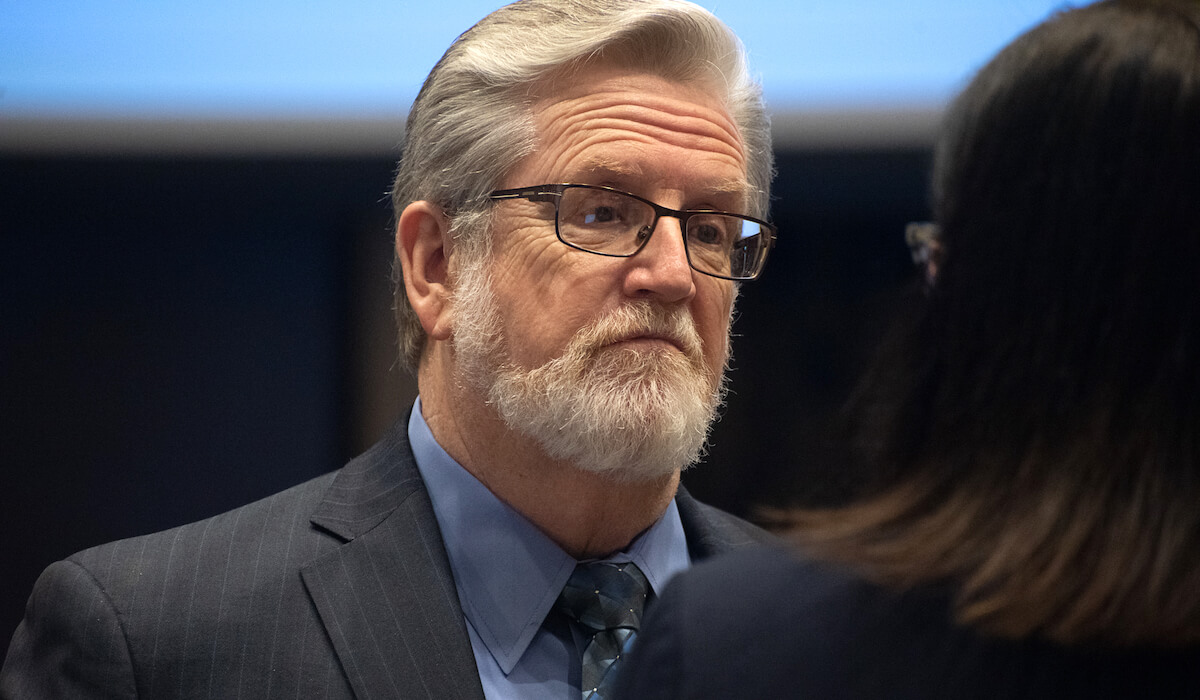
If an Oklahoma governor vetos a bill sent to him by the Legislature, lawmakers can force the bill into law with two-thirds support of both the House and the Senate.
Despite extreme frustration among legislators regarding Stitt’s Thursday press conference announcing his vetoes on budget items, legislators only ended up overriding one of the four measures the governor axed.
Both chambers overrode the veto on SB 1052, which directs the Oklahoma Department of Corrections to dedicate $4.89 million to the privately operated Lawton Correctional and Rehabilitation Facility for a per diem increase. It also directs $2.92 million to the privately operated Davis Correctional Facility for the same purpose.
“What are you going to do with those prisoners? Are you going to turn them loose?” said Senate Appropriations and Budget Chairman Roger Thompson (R-Okemah). “Well, no, we’re not going to do that. We have to take care of business and keep people safe.”
In an unusual turn of events, House members moved for HB 4473 — which proposed $181 million of one-time direct tax rebates to citizens — but unanimously voted against it 0-86. House members did the same thing on SB 1075 — which proposed elimination of the excise tax on motor vehicle purchases — voting against it 0-85.
The theatrics included calls by House leadership members for comprehensive conversations about Oklahoma’s tax structure. Thompson agreed.
“I just think we have to have a responsible conversation on any tax cut we do. We need to have a serious discussion in Oklahoma about tax reform all over,” Thompson said. “If we somehow broaden our base of taxes, we can actually lower taxes.”
Thompson said State Question 640’s requirement that revenue-raising measures receive three-fourths support in both the House and Senate is “an impediment” when it only takes a simple majority to cut taxes and slash state revenues. Asked Thursday if he supported the three-fourths threshold for new taxes, Stitt said he did.
Thompson noted that a simple majority of the Legislature can put revenue-raising proposals on a state ballot for a vote of the people.
“There’s been suggestions of some of our caucus members to put together a package and give it to the people of Oklahoma to vote on, not because we are trying to shirk our responsibility, but do you want a new tax structure in Oklahoma? We’ve got to have that,” Thompson said. “People expect services to be met, and that costs money, so how do we pay for those services? How do we keep the trains on the track?”
McCall: ‘I’m so disappointed by his comments’
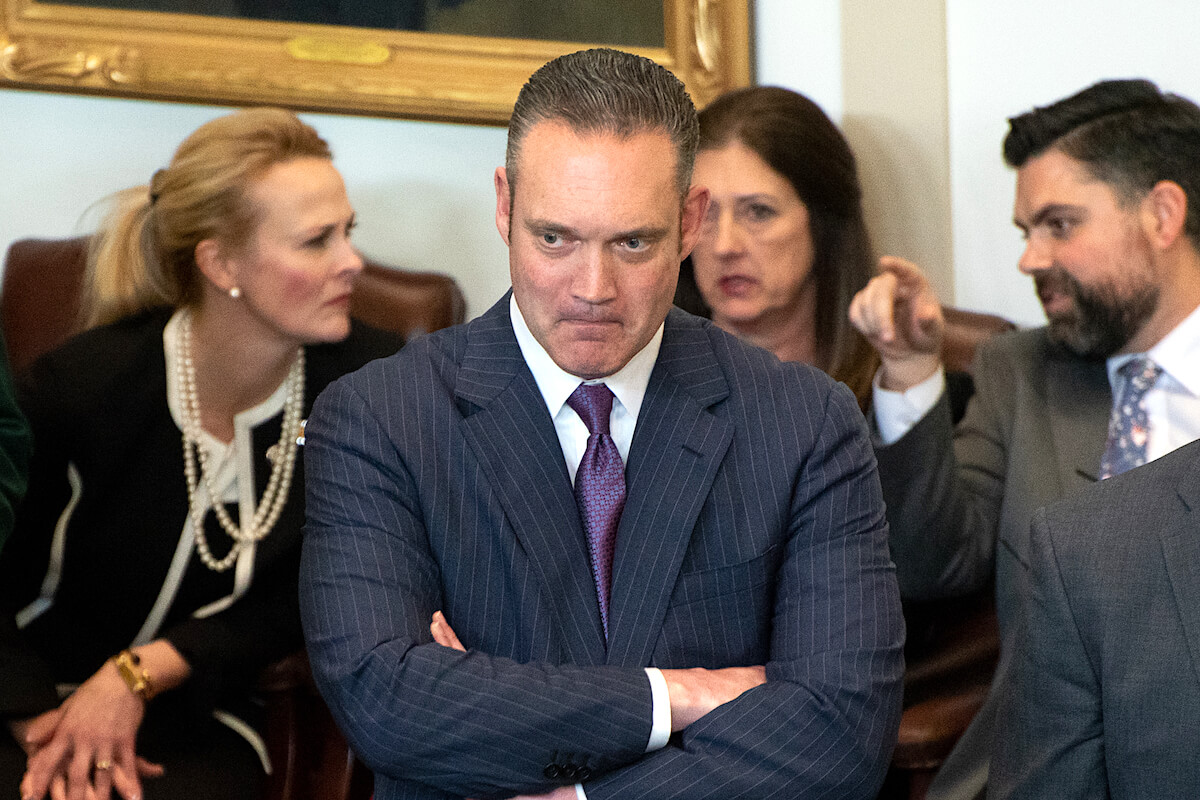
If there is one man in the Oklahoma Legislature who has beef with trains staying on tracks too long, it’s House Speaker Charles McCall (R-Atoka), whose arguably most spirited criticisms in his history as speaker had been about trains blocking railroad crossings in the community of Davis.
That changed Friday when McCall railed on the governor in a flowery press release and a 30-minute press conference. The release criticized Stitt for “unnecessary insults and falsehoods the governor excreted Thursday.”
“Ultimately, all of us serving the public must put the people first and do what’s best for them,” McCall said in his statement. “Amending the Legislature’s second extraordinary special session call to allow for a full inflation relief discussion will be our next step. Oklahomans deserve every option explored, not just one man’s narrow wishes.”
In his press conference minutes later, McCall said he was “extremely disappointed” by Stitt’s critiques.
“To go out and accuse the Legislature of pandering to special interests, doing things underhanded, backdoor deals — that doesn’t happen,” McCall said. “We have a transparent process. The governor is welcome to attend every time.”
McCall said Stitt’s prior budget negotiator, Amanda Rodriguez, resigned earlier this session and that Chief Operating Officer Steven Harpe left the country for his honeymoon two weeks ago as budget negotiations were finalized. McCall said Stitt took no responsibility for his team’s own actions, instead taking political shots at his fellow Republicans Thursday.
“That is well beneath the office that he holds. He is a four-year governor at this point, and it was completely disingenuous, and I was very disappointed in his actions personally yesterday, as are my colleagues,” McCall said. “The refund of taxpayer money to the people of the state of Oklahoma is not a Joe Biden playbook maneuver. If anything it’s a Donald Trump and George Bush issue. We want the most inflation relief for the people of the state of Oklahoma.”
Asked if he intended to vote for Stitt in the Republican primary on June 28, McCall did not answer one way or another, instead saying that Stitt’s call of a June 13 special session was “incredibly disingenuous.”
“That’s being punitive and another example of just trying to whip up on the Legislature,” McCall said.
McCall said he last spoke with Stitt about two weeks ago but that they typically have breakfast on Tuesdays. Despite his frustration with the governor, McCall said he would be “happy to have a conversation” any time.
“Not just conversation. I could be in Atoka, Oklahoma, working in my [private] sector job and the governor could say, ‘Hey, I’d like to meet with you.’ I’ll make the four-and-a-half-hour round trip to come up here and meet him,” McCall said. “We have a working relationship. That’s probably why I’m so disappointed by his comments yesterday. Because we work very hard to try to be very attentive to his concerns.”
Other bills forced into law
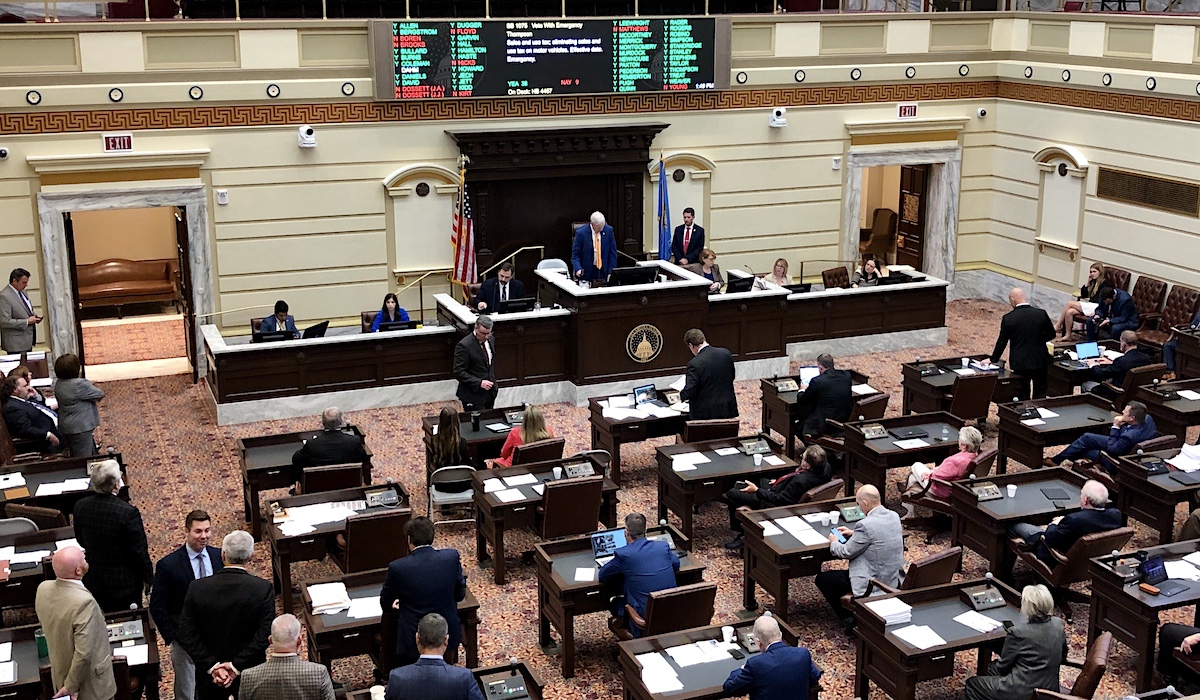
In the end, the Legislature only overrode Stitt’s vetoes on four other measures:
- HB 4412, which creates a soil preservation program within the Oklahoma Conservation Commission;
- HB 4457, which establishes an Oklahoma Route 66 Commission;
- HB 2046, which authorizes the creation of higher education districts for two-year colleges to access property tax dollars;
- SB 1695, which requires the filing of financial disclosure statements for agency directors and cabinet secretaries appointed by the governor.
The Senate voted 47-0 and the House voted 84-1 to override the veto on SB 1695. Only Rep. Sean Roberts — the lawmaker briefly but not officially known as The Patriot — voted against the override.
‘The long goodbye’
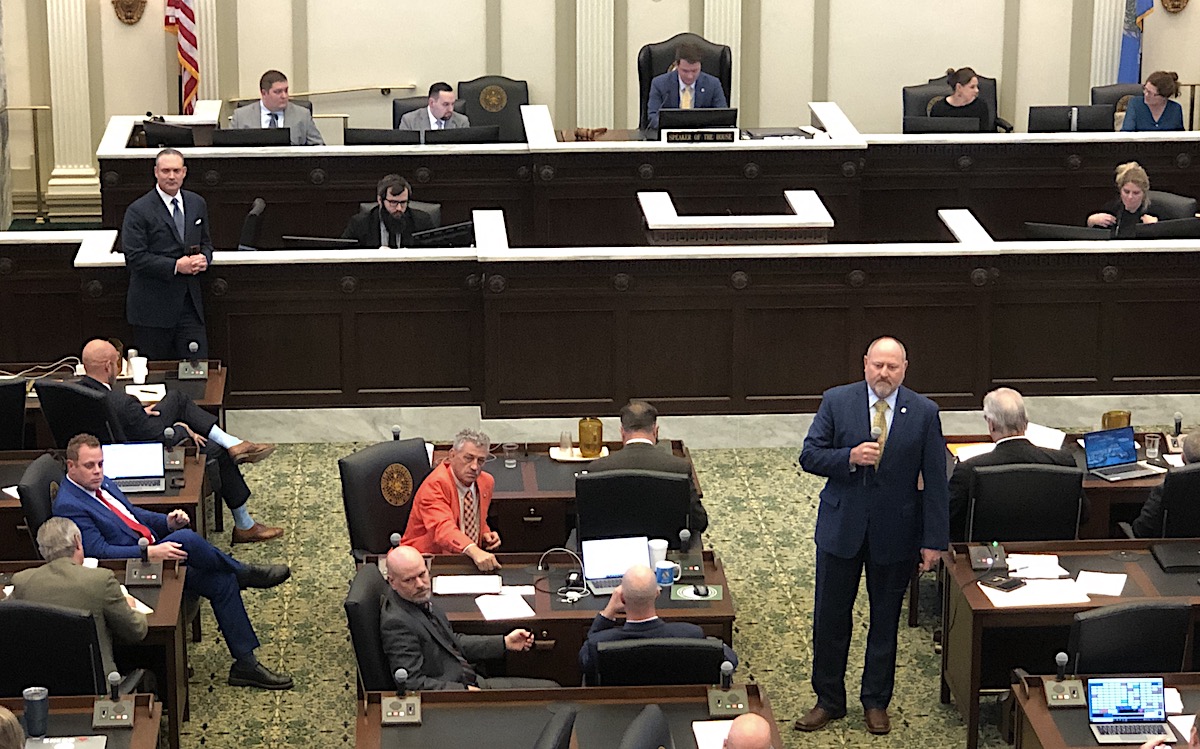
Lawmakers also gaveled in and out of the year’s second special session numerous times today to create 50 shell bills for use when determining American Rescue Plan Act appropriations later this year.
As he thanked staff for their long hours of work, McCall called the 2022 regular session “quite eventful.” Lawmakers are also facing another special session call — which will be the 58th Legislature’s third “extraordinary session” of the year — to convene on June 13. Stitt filed his call for the special session on Thursday, asking lawmakers to abolish, reduce or phase out the state sales tax on groceries and to reduce the state income tax rate.
Senate President Pro Tempore Greg Treat (R-OKC) also thanked staff members, noting long-time executive assistant Donna Garlick by name. He also referenced a classic Raymond Chandler novel when mentioning the special sessions that will be held this summer.
“This is going to be the long goodbye for everyone,” Treat said.





















